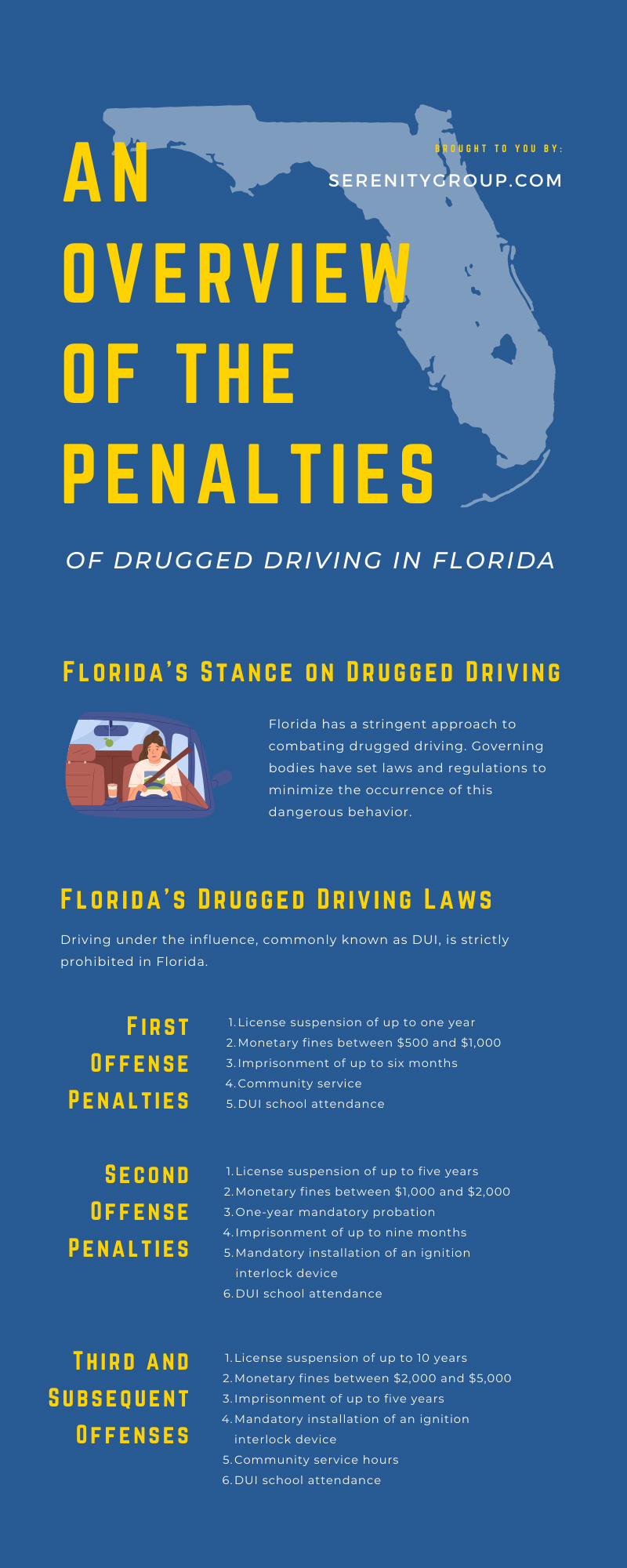An Overview of the Penalties of Drugged Driving in Florida

Drugged driving is a serious and widespread issue that poses a significant threat to all road users. The consequences of drugged driving can have far-reaching implications on the lives of affected people. This comprehensive overview will delve into drugged driving in Florida, the substances it encompasses, its consequences, and preventive measures.
Definition of Drugged Driving
Drugged driving refers to the unlawful act of operating a motor vehicle while under the influence of drugs, regardless of whether they are legally prescribed or illicit. Drugs encompass many substances, including prescription medication, over-the-counter medicine, and controlled substances. Drugs impair a driver’s cognitive and physical abilities, compromising their capacity to handle a vehicle and comply with the laws of the road.
Florida’s Stance on Drugged Driving
Florida has a stringent approach to combating drugged driving. Governing bodies have set laws and regulations to minimize the occurrence of this dangerous behavior. The penalties associated with drugged driving in Florida vary depending on the nature of the crime and the substance the driver used. Note that the repercussions can be severe, as they are meant to discourage people from engaging in drugged driving.
Florida’s Drugged Driving Laws
Driving under the influence, commonly known as DUI, is strictly prohibited in Florida. A person is under the influence when the consumption of alcohol, chemical substances, or controlled substances impairs their normal facilities.
These laws are in place to safeguard personal and public safety and ensure responsible and lawful driving practices. By addressing the details of drugged driving in Florida, we aim to raise awareness about this pressing issue, empower citizens with knowledge, and foster a safer driving environment for all.
Substances Included Under Drugged Driving
The scope of substances considered under drugged driving is broad. Florida’s laws categorize several substances that may impair a driver’s faculties. These include some prescription medications, which, despite their legal status, may negatively affect driving abilities if misused. Over-the-counter drugs also fall into this category, as certain non-prescription medicines can cause drowsiness or other side effects impacting a person’s capacity to drive safely.
Drugged driving laws also cover illegal drugs, such as marijuana, cocaine, and heroin, with strict penalties for people caught driving under the influence. Lastly, inhalants—substances inhaled to achieve a temporary high—are also under the umbrella of substances contributing to drugged driving.
Detection Methods for Drugged Driving
Florida law enforcement employs various strategies to detect drugged driving. One common approach is through traffic stop observations, where officers look for telltale signs of impairment, such as erratic driving. If officers suspect a driver is driving under the influence, they may administer field sobriety tests. These tests assess a driver’s physical and cognitive function and can provide grounds for further investigation.
Law enforcement may call upon a drug recognition expert (DRE) to evaluate a driver. These specialists detect signs of drug use that may take time to become obvious. Finally, blood and urine tests can provide concrete evidence of drug use, solidifying the case against a driver. These methods work in tandem to keep Florida’s roads safe for all motorists.
First Offense Penalties
Penalties for first-time drugged driving in Florida can include the following:
- License suspension of up to one year
- Monetary fines between $500 and $1,000
- Imprisonment of up to six months
- Community service
- DUI school attendance
Second Offense Penalties
For a second offense within five years of a prior conviction, the penalties increase and may include any of the following:
- License suspension of up to five years
- Monetary fines between $1,000 and $2,000
- One-year mandatory probation
- Imprisonment of up to nine months
- Mandatory installation of an ignition interlock device
- DUI school attendance
Third and Subsequent Offenses
A third or subsequent drugged driving offense within 10 years of a prior conviction results in even harsher penalties:
- License suspension of up to 10 years
- Monetary fines between $2,000 and $5,000
- Imprisonment of up to five years
- Mandatory installation of an ignition interlock device
- Community service hours
- DUI school attendance
Additional Consequences of Drugged Driving in Florida
Aside from legal penalties, other consequences can result from a drugged driving offense:
- Higher insurance premiums
- Loss of employment or job opportunities
- Negative impact on professional licenses
- Strained relationships with family and friends
- Guilt and regret for potentially causing harm to yourself or others
Impact on Driver’s License
A drugged driving conviction in Florida can also result in driver’s license revocation. Florida can revoke a person’s license indefinitely, with no guarantee of ever obtaining a valid driver’s license again. As a result, individuals who face this consequence may experience significant challenges in their daily lives, such as limitations in transportation options and difficulties fulfilling personal and professional responsibilities that require a valid driver’s license.
Revoking a driver’s license can have long-lasting effects on one’s financial well-being, as it may lead to increased reliance on alternative transportation methods and potential job loss due to the inability to commute.
Even if you get your license back, you may be a part of the FR44 system. This system requires you to get more insurance than the state average, which can increase your premium. Fortunately, you can find cheap FR44 insurance in Florida from many providers.
Preventive Measures Against Drugged Driving
Preventing drugged driving is the most effective way to avoid the severe penalties associated with this offense. You can stay away from driving while under the influence in a few ways. Firstly, adhere to the instructions and warnings provided with prescription medications, as misuse can result in impaired driving. Secondly, if you know someone has consumed substances that could affect their ability to drive, refrain from letting them get behind the wheel. Suitable alternatives could include public transportation, ride sharing services, or designated drivers.
Lastly, being aware of the dangers and repercussions of drugged driving can be the strongest deterrent. By educating yourself and spreading this knowledge to others, everyone can reduce the incidence of drugged driving.
Drugged driving is a serious offense in Florida and has severe penalties that can affect your life. Understand the laws and consequences of drugged driving, and take preventive measures to avoid this dangerous behavior. Remember, safety on the road should always be your priority!


Recent Comments